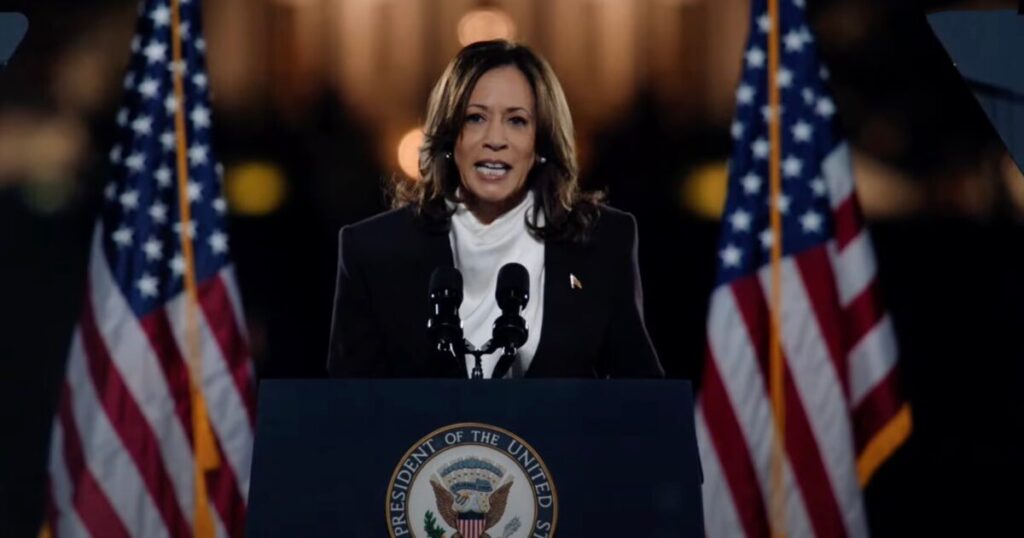Kamala Harris has once again changed her political stance on a vital issue—immigration—marking her latest pivot during a campaign speech at the Ellipse in Washington. In a notable shift, she criticized former President Donald Trump’s immigration policies, promising to take a firm approach on illegal immigration. During her speech, she expressed her commitment to deploying tougher immigration enforcement measures, including deporting undocumented immigrants. She emphasized that politicians must treat immigration as a severe challenge needing collaborative solutions rather than using it as a political tool for electoral gain. Harris asserted her dedication to working with both Democrats and Republicans to reinstate the proposed border security bill that Trump had previously rejected, revealing her intention to act decisively on issues she once openly supported.
This recent change in Harris’s rhetoric has raised eyebrows, particularly given her past advocacy for more lenient immigration policies and her long-standing support of open borders. Previously, she had criticized efforts to secure the border and was recognized for supporting decriminalizing illegal border crossings, calling people who cross the border unlawfully mischaracterized as criminals. With this new narrative, however, believes she has opted for a more aggressive stance in a political climate that demands stronger immigration reform and security. This sudden reversal appears to be a strategy aimed at garnering political support in the face of an increasingly competitive electoral landscape.
Additionally, several claims made by Trump’s campaign during their debates underscored the evolving nature of Harris’s immigration views. For example, Harris had explicitly raised her hand in favor of decriminalizing illegal border crossings, and again emphasized that undocumented immigrants should not be treated as criminals. This shift emphasizes the jarring contrast between her previous and current opinions, portraying her shift as a politically motivated maneuver rather than a genuine change of heart about immigration issues. Harris’s historical support for various liberal immigration policies adds another layer of complexity, suggesting that her newfound hardline approach may lack authenticity.
The comparisons between Harris’s past statements and her recent pledges reveal the tension within her immigration policy stance. Harris’s history includes advocating for “sanctuary city” protections, supporting amnesty for undocumented immigrants already in the country, and criticizing past administrations for high deportation rates. She had branded proposals for a border wall as “medieval” and dismissed concerns surrounding potential threats from the southern border. These statements paint a picture of a political figure who formerly downplayed the need for stringent immigration measures, raising questions about the motivations behind her sudden shift to a more assertive legislative framework.
As a so-called “border czar,” Harris finds herself in a precarious position. Despite her claims of stepped-up enforcement, her limited engagement with the southern border—visiting only once—raises skepticism regarding her commitment to reforming immigration policies. Critics highlight that this lack of a proactive approach has contributed to a surge in illegal immigration across the United States, resulting in increased crime and hardship for American communities. The inconsistencies in her rhetoric, coupled with her mild history of addressing border issues, suggest the potential for a disconnect between her campaign promises and real-world execution should she assume the presidency.
In conclusion, Kamala Harris’s dramatic shift toward advocating tougher immigration enforcement encapsulates a broader narrative of political adaptability in response to public sentiment and electoral pressures. As she aims to reposition herself as a serious contender in the immigration debate, critics remain cautious, pointing to her previously stated beliefs and past actions that contribute to a narrative of hypocrisy. As Harris navigates these political waters, the question remains whether her newfound hardline stance will resonate with voters or if her previous positions will overshadow her campaign efforts. The immigration debate continues to be an essential topic in American politics, and how Harris aligns her policies going forward may define her political legacy.

